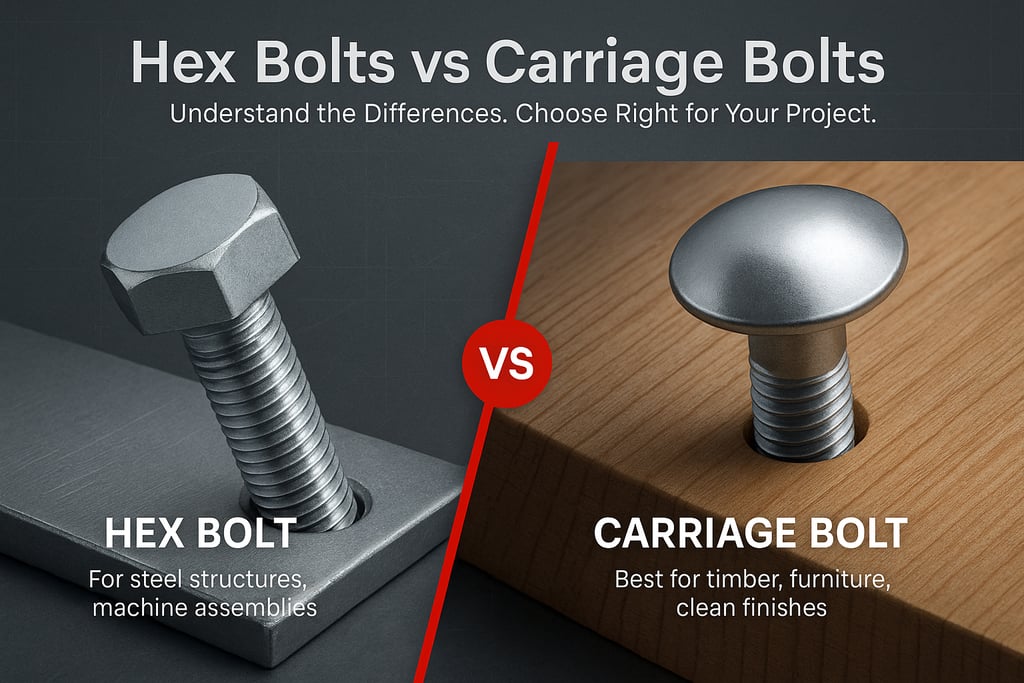Hex Bolts vs Carriage Bolts | Construction Fastener Guide
Compare hex bolts and carriage bolts in construction. Learn key differences, strengths, and ideal applications. A must-read guide for professionals in the UAE.
PRODUCT-SPECIFIC


Hex Bolts vs Carriage Bolts: The Ultimate Guide for Construction Professionals
In the world of construction and industrial assembly, the difference between project success and failure often comes down to the smallest details—particularly your choice of fasteners. Selecting between hex bolts and carriage bolts isn't just a technical specification; it's a fundamental decision that impacts structural integrity, installation efficiency, and long-term durability.
As UAE's leading fastener supplier, Bait Alnuhas has equipped thousands of construction projects across the GCC with the right fastening solutions. This comprehensive guide will help engineers, procurement managers, and construction professionals make informed decisions about these two essential fastener types.
🔩Hex Bolts: The Workhorse of Industrial Fastening
Hex bolts, characterized by their six-sided heads, are the most versatile and widely used mechanical fasteners in construction and industrial applications. Their design allows for high torque application, making them indispensable for structural connections.
🔧 Design & Engineering Features
Hexagonal head enables high-torque tightening with standard wrenches
Available in partially threaded (for shear resistance) and fully threaded versions
Requires matching hex nut and washer for proper installation
Threads conform to ISO metric or Unified Thread Standard
🏭 Material Specifications
Carbon Steel Grades: 4.6 (general purpose), 8.8 (high strength), 10.9 (extra high strength), 12.9 (ultra high strength)
Stainless Steel: 304 (general corrosion resistance), 316 (marine grade)
Surface Treatments: Hot-dip galvanized (ASTM A153), Zinc plating (ASTM B633), Dacromet coating
Alternative Materials: Titanium (aerospace), Brass (electrical), Aluminum (lightweight applications)
🏗️ Industrial Applications
Structural steel connections in buildings and bridges
Heavy machinery assembly and maintenance
Infrastructure projects including power plants and oil refineries
Transportation equipment from shipbuilding to railway construction
Technical Insight: Hex bolts provide superior tensile strength (up to 1,200 MPa for grade 12.9) and are ideal for joints subject to vibration, dynamic loads, and shear forces. Their design allows for precise torque application, critical in structural engineering.
Explore our hex bolt inventory with detailed technical specifications for your project requirements.
⚙️Carriage Bolts: The Secure Choice for Wood and Decorative Applications
Carriage bolts (also called coach bolts) feature a distinctive dome head with square neck, designed specifically for applications where rotation prevention and aesthetic finish are priorities.
🛠️ Unique Design Characteristics
Dome head provides smooth, tamper-resistant surface
Square neck beneath head bites into material to prevent rotation
Installed from exposed side with nut/washer on reverse
Typically fully threaded for maximum adjustability
🌐 Material Options & Finishes
Mild steel with zinc plating (common for indoor use)
Hot-dip galvanized for outdoor and corrosive environments
Stainless steel 304/316 for marine and coastal applications
Decorative finishes including brass, chrome, and powder coating
🪚 Common Use Cases
Wood construction (timber framing, decking, fencing)
Architectural elements (pergolas, cladding, decorative metalwork)
Furniture assembly (both commercial and residential)
Light-duty metal connections where appearance matters
Installation Tip: The square neck requires a properly sized pre-drilled square hole in wood applications. For metal, use with square washers to prevent rotation during tightening.
View our carriage bolt selection with various head styles and material options.
Technical Comparison: Hex Bolts vs Carriage Bolts
The table below highlights the key differences that inform fastener selection for engineering projects:
FeatureHex BoltsCarriage BoltsHead DesignHexagonal (6 sides) for wrench/socket accessDome-shaped with square neckInstallationRequires access to both sides (head and nut)Installed from one side onlyThreadingPartial or full thread optionsTypically fully threadedRotation ResistanceRequires wrench on both endsSquare neck prevents rotationTorque CapacityHigh (up to specified proof load)Moderate (limited by neck design)Shear StrengthExcellent (especially partially threaded)Good (dependent on material)Aesthetic ConsiderationsIndustrial appearanceClean, finished lookSecurityStandard (removable with tools)Semi-tamper resistantCost FactorsEconomical for high-volumeSlightly higher due to specialized head
Application Guidelines: When to Use Each Fastener Type
Opt for Hex Bolts When
Connecting steel-to-steel in structural applications
High load-bearing capacity is critical
Projects involve vibration or dynamic loads
Precise torque control is required
Working with heavy gauge metals
Industrial appearance is acceptable
Choose Carriage Bolts When
Working with wood-to-wood or wood-to-metal joints
Fastener heads will be visibly exposed
Basic tamper resistance is desired
Installation access is limited to one side
Aesthetic finish is important
Light-to-medium duty applications
GCC Market Perspective: Fastener Trends in UAE Construction
The Middle East construction market presents unique challenges that influence fastener selection:
Hex bolt dominance in steel-intensive projects like high-rises (Burj Khalifa used over 2 million high-strength hex bolts)
Carriage bolt preference in luxury developments for pergolas, decking, and architectural woodwork
Material considerations due to coastal corrosion in Dubai and Abu Dhabi (316 stainless demand up 27% since 2020)
Solar farm boom driving need for specialized hex bolts in mounting systems
Prefab construction increasing demand for both types in modular installations
"Bait Alnuhas has been a trusted fastener supplier across a wide range of UAE projects over the years. There's a noticeable shift toward using certified, high-strength materials, particularly in structural applications within seismic-prone areas."
Your Trusted Fastener Partner in the GCC
Bait Alnuhas isn't just a supplier—we're fastener experts who understand the technical requirements of Middle East construction. Our value proposition:
Get Expert ConsultationDownload Product Catalog
Frequently Asked Questions
Can carriage bolts be used in structural steel applications?
While possible in some light structural applications, carriage bolts are generally not recommended for primary structural steel connections due to:
Limited torque capacity compared to hex bolts
Potential rotation issues under heavy vibration
Lack of standardized testing for structural grades
For structural steel, always specify proper structural hex bolts meeting ASTM A325 or A490 specifications.
What's the best way to prevent corrosion in coastal GCC applications?
For projects in Dubai, Abu Dhabi, and other coastal areas, we recommend:
316 stainless steel for maximum corrosion resistance
Hot-dip galvanized with additional sealant for cost-sensitive projects
Dacromet-coated fasteners for high-temperature environments
Regular inspection cycles for critical connections
Our corrosion protection guide provides detailed recommendations.
Do you offer custom fastener solutions for unique projects?
Absolutely. Our engineering team can develop custom fastener solutions for:
Special materials or coatings
Unique head designs or markings
Non-standard thread patterns
Bespoke packaging for large projects
Contact our technical team to discuss your specific requirements.
